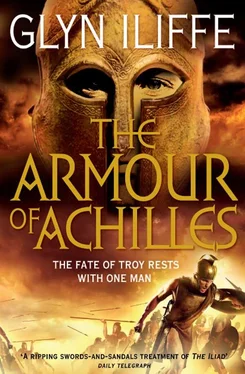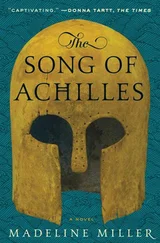Glyn Iliffe - The Armour of Achilles
Здесь есть возможность читать онлайн «Glyn Iliffe - The Armour of Achilles» весь текст электронной книги совершенно бесплатно (целиком полную версию без сокращений). В некоторых случаях можно слушать аудио, скачать через торрент в формате fb2 и присутствует краткое содержание. Год выпуска: 0101, ISBN: 0101, Издательство: Pan Books, Жанр: Старинная литература, на английском языке. Описание произведения, (предисловие) а так же отзывы посетителей доступны на портале библиотеки ЛибКат.
- Название:The Armour of Achilles
- Автор:
- Издательство:Pan Books
- Жанр:
- Год:0101
- ISBN:9781447205098
- Рейтинг книги:4 / 5. Голосов: 1
-
Избранное:Добавить в избранное
- Отзывы:
-
Ваша оценка:
- 80
- 1
- 2
- 3
- 4
- 5
The Armour of Achilles: краткое содержание, описание и аннотация
Предлагаем к чтению аннотацию, описание, краткое содержание или предисловие (зависит от того, что написал сам автор книги «The Armour of Achilles»). Если вы не нашли необходимую информацию о книге — напишите в комментариях, мы постараемся отыскать её.
The Armour of Achilles — читать онлайн бесплатно полную книгу (весь текст) целиком
Ниже представлен текст книги, разбитый по страницам. Система сохранения места последней прочитанной страницы, позволяет с удобством читать онлайн бесплатно книгу «The Armour of Achilles», без необходимости каждый раз заново искать на чём Вы остановились. Поставьте закладку, и сможете в любой момент перейти на страницу, на которой закончили чтение.
Интервал:
Закладка:
A handful of sentinels stared silently out from behind the walls of Lyrnessus and a low horn call vibrated out across the plain to greet the newcomers, but no reinforcements hastened to join their colleagues on the battlements. Instead, the sombre noise was followed by a silence, which was quickly devoured by the clanking of the Greek army as it spread across the plain like pitch spilled from a bucket, file after file marching relentlessly towards their objective. Soon the soldiers of Argos and Ithaca were in place at the western foot of the hill, a bowshot from the walls, while the Myrmidons straddled the road to the south, facing the gate. The Locrian archers formed a wide crescent behind them, where they began standing their arrows point-down in the grass, ready to be fitted to their bowstrings and fired at any enemy that dared show themselves above the parapets. As the dust cloud the Greek host had raised was carried forward on a gentle breeze to veil the walls of Lyrnessus, Odysseus looked left to where Diomedes stood at the head of his Argives. Diomedes raised his arm and nodded. In response, Odysseus looked right to Achilles and raised his own arm.
‘Ladders at the ready,’ Eperitus called out behind him, all the time keeping his eyes on the distant, golden-haired figure of Achilles.
Achilles dismounted and gave the reins to one of his men, who in return handed him a bright helmet with a black plume and a visor shaped in the likeness of a grimacing face. Achilles was the only warrior who wore such a helmet, designed not for additional protection but to distinguish him on the battlefield, his reputation being such that the mere sight of the helmet filled his opponents with terror. As the soldier led the prince’s horse away, Achilles put the helmet on his head and lowered the hinged visor into place, while Patroclus stood before him and tied the leather thongs beneath his chin. With all eyes watching him, Achilles took up his shield and raised his huge spear above his head. A moment later, the point fell and the Greeks gave a great shout, their voices rebounding from the city walls.
Chapter Two
S TORMING THE W ALLS
Odysseus did not cheer. Gritting his teeth behind sealed lips, he waved the Ithacan ladder parties forward. The scrambling of leather sandals on hard earth was followed by the sharp smell of sweat and the sound of cursing as the men ran past him, dashing quickly up the long, stony slope towards Lyrnessus. At their head were the groups led by Antiphus and Polites, the former with his bow slung across his back and the latter striding forward as if he would smash down the walls with his bare fists.
‘Something’s wrong,’ Odysseus said in a low voice as he watched the advance on the walls. ‘There’s not one man on the battlements. Even the soldiers we saw earlier have gone.’
‘They’ve probably thrown away their armour and are cowering in a temple somewhere, hoping their gods will protect them,’ Eperitus replied.
Odysseus shook his head. ‘If we’ve learned anything from this war, it’s that Trojans aren’t cowards. Some of them should be up there at least, trying to save their families from slavery or death. I think they’re not on the walls for a reason – either they’re expecting help from outside, or they’ve a better defence than we’re guessing. Eperitus, go and warn Ajax to keep a close eye on those hills to the north; I’m going to take the army closer in to the walls before—’
At that moment, as the ladder parties were nearing the ditch, a man climbed up on to the battlements and looked down in haughty defiance at the crawling mass of Greeks before the city. That his dark eyes and large, hooked nose belonged to Trojan nobility – if not royalty – was beyond doubt, and every Greek who looked up at his bearded face sensed that his appearance meant an end to their hopes of an easy victory. The man was tall and strong with enormous shoulders and huge fists that hung at his sides, big enough to kill a man with a single punch. As if to prove the point, though he wore a splendid breastplate of bronze scales and a massive helmet with a green plume, he carried no weapon. Instead, he raised a palm towards the advancing foes and called out in a loud voice:
‘Enemies of Troy, go back to your ships. Nothing but death awaits you here. Go back to your ships and sail home to Greece, before the vengeance of Apollo falls upon you. King Sarpedon of the Lycians has spoken.’
‘Told you,’ Odysseus said, arching his eyebrows knowingly at Eperitus. ‘The whole city must be filled with Lycians, just waiting for us to come and throw ourselves on to their spears. Aeneas is in there too, don’t forget, and I’ll stake my kingdom there’s a host of Dardanians with him.’
‘Then Hector must have guessed we’d try to take Lyrnessus,’ Eperitus said, watching the men with the ladders, who had halted their advance and were looking up at the walls as if death would sweep down on them from the battlements at any moment. ‘Either that or the information that the garrison had been stripped was false and we’ve been lured into a trap.’
‘It wouldn’t be the first time they’ve outwitted us,’ Odysseus replied. ‘And yet our spies told us Aeneas was inside Troy only the day before yesterday. If that’s true then he was sent here on purpose – and that means Hector must have known we were coming.’
As he spoke, Sarpedon stepped back down so that only the upper half of his body remained visible behind the stone parapet. A moment of quiet followed in which the ranks of Argives, Ithacans and Myrmidons shifted restlessly, while some of the Locrians fitted arrows and half drew their bowstrings in readiness. Then a slow, mocking laugh broke the silence. Eperitus looked around to see who among the Greeks could draw amusement from the shock of Sarpedon’s presence, and saw Achilles leaning on his shield and chuckling as he looked up at the Lycian king.
‘Sarpedon, you old fool,’ he called, shaking his head and smiling. ‘Do you really think we Greeks are going to return to our homes before Troy has fallen? And do you think that by standing on the crumbling walls of this old dung heap you’re going to stop me from knocking its worm-eaten gates off their hinges and killing every living thing that opposes me? Then let me make you an offer: any Lycian inside the walls of Lyrnessus, including yourself, who wants to return to his home now can do so, taking his armaments, his honour and his life with him. All I ask is your word that none will ever come back to the aid of Troy. But any who choose to remain will be slaughtered, without mercy, and his body left as carrion for the birds. Achilles, chief of the Myrmidons, has spoken.’
There was a roar of approval from the Greek ranks, but Sarpedon raised his hand again and they fell silent.
‘I am familiar with your reputation, Prince Achilles – as a butcher who knows no restraint, a murdering dog whose excesses are shameful even to the Greeks. You strut around the battlefield as if Hades himself cannot claim you, yet all the time the shadow of death is at your heels. Do you think we haven’t heard of your own mother’s prophecy, that you’ll die here in Ilium? Perhaps today your fate will catch up with you.’
Without warning, a spear flew towards the battlements and split the air where, a heartbeat before, Sarpedon’s head had been. Slowly, the Lycian’s shocked face rose back above the parapet to see Patroclus standing in front of Achilles, his arrogant features twisted with fury.
‘Your own fate will strike you down long before a drop of Achilles’s blood touches Trojan soil,’ he shouted. ‘If you ever see your homeland again, Sarpedon, it’ll be as a corpse, to be wept over by your wife as she curses the gods for their cruelty.’
Читать дальшеИнтервал:
Закладка:
Похожие книги на «The Armour of Achilles»
Представляем Вашему вниманию похожие книги на «The Armour of Achilles» списком для выбора. Мы отобрали схожую по названию и смыслу литературу в надежде предоставить читателям больше вариантов отыскать новые, интересные, ещё непрочитанные произведения.
Обсуждение, отзывы о книге «The Armour of Achilles» и просто собственные мнения читателей. Оставьте ваши комментарии, напишите, что Вы думаете о произведении, его смысле или главных героях. Укажите что конкретно понравилось, а что нет, и почему Вы так считаете.












